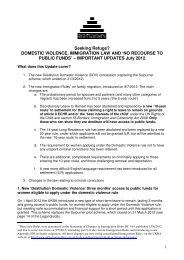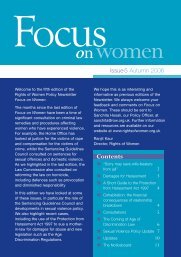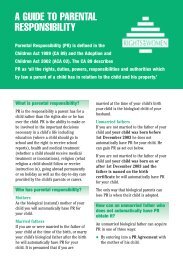Seeking Refuge? - Rights of Women
Seeking Refuge? - Rights of Women
Seeking Refuge? - Rights of Women
You also want an ePaper? Increase the reach of your titles
YUMPU automatically turns print PDFs into web optimized ePapers that Google loves.
Once you have confirmed that your statement is<br />
correct and answered any additional questions<br />
from your legal representative, you will be asked<br />
questions by the Home Office Presenting Officer.<br />
This is called cross-examination. Crossexamination<br />
is used by the Home Office<br />
Presenting Officer to test whether or not you are<br />
telling the truth. You may be asked questions<br />
based on your statement, or on your asylum<br />
interview. You may be asked questions about your<br />
country and how you got to the UK. It is<br />
important that you answer these questions clearly<br />
and accurately. If you do not understand the<br />
question or know the answer, you should say so.<br />
If you are not sure about something, for example,<br />
the date on which something happened, it is<br />
important not to guess.<br />
After cross-examination, your legal representative<br />
may ask you some additional, final questions, to<br />
clarify any points raised in cross-examination.<br />
The Immigration Judge may also ask you<br />
questions. He or she can do this at any time while<br />
you are giving evidence.<br />
After you have given evidence<br />
After you have given evidence, any other<br />
witnesses that you have may be called to give<br />
evidence. After all the witnesses have been heard,<br />
the Home Office Presenting Officer will make a<br />
speech to the Immigration Judge setting out why<br />
he or she thinks that the decision to refuse you<br />
protection in the UK was correct. Your legal<br />
representative will then make a speech setting out<br />
why the decision was wrong, and why you should<br />
be granted protection in the UK. The arguments<br />
made by both the Home Office Presenting Officer<br />
and your legal representative will include:<br />
• their view <strong>of</strong> the evidence, including what you<br />
and any witnesses said at the hearing;<br />
• the situation in your country; and<br />
• how the law should be applied to your case.<br />
Who has to prove what at my<br />
appeal?<br />
At the AIT, it is the responsibility <strong>of</strong> the person who<br />
says something to prove that what they are saying is<br />
true. This means that if you are arguing that you<br />
should be given <strong>Refuge</strong>e Leave in the UK, it is for<br />
you, and your legal representative, to prove that<br />
you are entitled to this type <strong>of</strong> protection under the<br />
<strong>Refuge</strong>e Convention. You do not need to prove that<br />
it is certain that you would be harmed if you were<br />
returned to your country. Instead, you have to show<br />
that there is a “real risk” that if you were returned<br />
to your country you would be persecuted or face<br />
serious harm. For information about persecution<br />
and serious harm, see Chapter 2.<br />
Your legal representative, or you, if you don’t<br />
have one, has to explain to the AIT why there<br />
is a real risk that if you were returned to your<br />
country, you would face persecution or<br />
some other form <strong>of</strong> serious harm.<br />
Representing yourself at your<br />
appeal<br />
You may find it useful to read this section whether<br />
or not you have legal representation.<br />
If you are unable to get legal representation for<br />
your appeal, you can represent yourself. You can<br />
get free legal advice from <strong>Rights</strong> <strong>of</strong> <strong>Women</strong>’s legal<br />
advice line on 020 7251 8887 (telephone) or<br />
020 7490 2562 (textphone). The advice line is<br />
open on Mondays 11am-1pm and Tuesdays<br />
10am-12 noon.<br />
If you are representing yourself, it is important<br />
that the AIT and the Home Office know where<br />
you are living, so that they can send you<br />
information about your case. It is also important<br />
that you attend any Case Management Review<br />
Hearing that is arranged, as well as the appeal<br />
itself.<br />
If you are representing yourself, the AIT cannot<br />
ask you to do anything to prepare the case unless<br />
they are sure that you are able to do what they<br />
ask. This means that the Home Office will be<br />
responsible for preparing the papers for the<br />
appeal.<br />
It is important that you tell the AIT and the Home<br />
Office about any witnesses that you are bringing<br />
to your appeal, and about any other evidence that<br />
you will be relying on. It is also important that you<br />
make sure that any witnesses you have attend the<br />
hearing, and that you take to the hearing any<br />
relevant documents you have.<br />
When an asylum-seeker is representing herself, it<br />
is the responsibility <strong>of</strong> the Immigration Judge to<br />
make sure that the appeal is carried out in a way<br />
that is fair. This means making sure that you<br />
understand what is happening, and that you have<br />
the time that you need to explain why you should<br />
remain in the UK.<br />
52
















